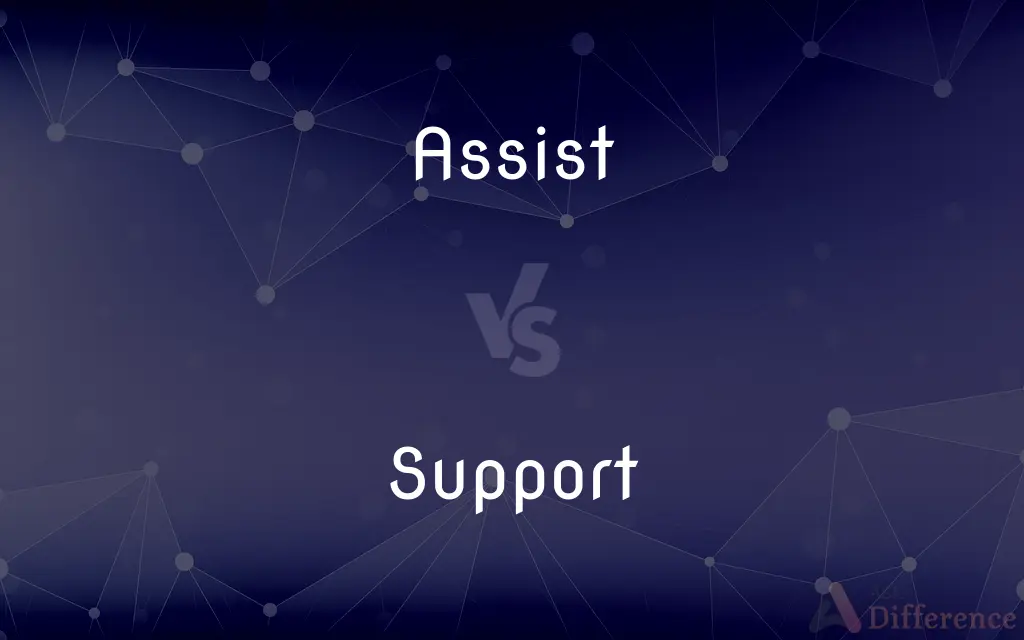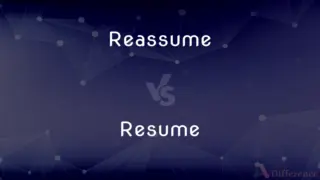Assist vs. Support — What's the Difference?
By Tayyaba Rehman & Urooj Arif — Updated on March 5, 2024
Assist and support are closely related terms often used interchangeably, but they convey slightly different nuances in various contexts. Assist implies providing help or aid to make a task easier, while support encompasses a broader range of aid.

Difference Between Assist and Support
Table of Contents
ADVERTISEMENT
Key Differences
Assist typically refers to the act of helping someone to complete a task or achieve a goal, often in a more hands-on or direct manner. This could involve providing physical help, advice, or resources to facilitate the completion of a specific task. On the other hand, support is more encompassing and can refer to any form of backing or assistance given to someone, not necessarily tied to a specific task. It includes emotional support, such as offering encouragement or empathy, financial support like providing funds or resources, and physical support, such as aiding someone with mobility issues.
An assistant helping their boss with paperwork or a friend helping another move furniture are instances where assist is the operative term. Support is about providing a foundation or sustenance that enables a person or entity to continue functioning or thriving.
While assist is often seen as more temporary or task-specific, support suggests a more sustained or comprehensive form of aid. For instance, assisting someone with a project implies a more limited engagement, whereas supporting someone through a difficult period implies a longer-term commitment.
The context in which these terms are used can also highlight their differences. In sports, for example, an assist is a specific action that directly helps score a point, clearly defining the helper's role. In contrast, support roles in an organization may involve a variety of tasks and responsibilities aimed at maintaining the overall well-being and success of the organization or its members, without being tied to specific, measurable outcomes.
While both assist and support are acts of helping, assist is generally more task-oriented and direct, whereas support is broader and can be sustained over a longer period, encompassing emotional, financial, and physical aid.
ADVERTISEMENT
Comparison Chart
Definition
Providing help or aid to complete a task.
Offering backing or aid, not limited to tasks.
Scope
Task-specific, direct assistance.
Broad, including emotional, financial, physical aid.
Duration
Often temporary or for a specific project.
Can be sustained or long-term.
Context
More hands-on or active involvement.
Can be passive or active, encompassing overall well-being.
Examples
Assisting in paperwork, moving furniture.
Emotional encouragement, financial backing.
Compare with Definitions
Assist
Contribution towards a goal in a direct manner.
He assisted in the project by providing expert advice.
Support
Offering encouragement or emotional help.
Her family supported her through the difficult times.
Assist
Providing support to make an action easier.
The software assists users by automating repetitive tasks.
Support
Providing financial or material aid.
The foundation supports underprivileged students with scholarships.
Assist
To play a part in helping achieve a result.
She assisted the team by scoring crucial points.
Support
Sustaining someone or something over a period.
The columns support the structure of the building.
Assist
To aid or help someone in completing a specific task.
The teacher stayed after school to assist students with their homework.
Support
To bear all or part of the weight.
The bridge supports the weight of the vehicles.
Assist
Facilitation of a process or activity.
Volunteers assist in organizing the community event.
Support
To uphold or defend as valid or right.
He supports the new policy for its environmental benefits.
Assist
To give help or support to, especially as a subordinate or supplement; aid
The clerk assisted the judge by looking up related precedents. Her breathing was assisted by a respirator.
Support
To bear the weight of, especially from below; keep from falling, sinking, or slipping
Pillars support the roof.
Assist
To give aid or support
Who assisted during the operation?.
Support
To provide for or maintain by supplying with money or necessities
The homeless shelter is supported solely by donations.
Assist
A helpful action or an act of giving.
The foundation gave a much needed assist to the shelter.
Support
To endure; tolerate
"At supper there was such a conflux of company that I could scarcely support the tumult" (Samuel Johnson).
Assist
Give help or assistance; be of service;
Everyone helped out during the earthquake
Can you help me carry this table?
She never helps around the house
Support
To offer help or advice regarding (a product or service).
Assist
Act as an assistant in a subordinate or supportive function
Support
The provision of money or the necessities of life
Child support.
Support
(archaic) To endure without being overcome; bear; undergo; to tolerate.
Support
Something which supports.
Don't move that beam! It's a support for the whole platform.
Support
Financial or other help.
The government provides support to the arts in several ways.
Support
Financial resources provided to make some project possible;
The foundation provided support for the experiment
Common Curiosities
What does it mean to assist someone?
To assist someone means to help them complete a task or achieve a goal through direct involvement or aid.
Can support be emotional?
Yes, support can be emotional, such as offering empathy or encouragement during challenging times.
How do sports use the term assist?
In sports, an assist is a specific action that directly helps score a point or achieve a goal, clearly defining a contributory role.
Is financial help considered assistance or support?
Financial help can be considered both assistance and support, depending on the context and the intended outcome.
What makes support long-term?
Support is considered long-term when it's sustained over a period and aimed at overall well-being, not tied to a single task.
Can one provide support without being physically present?
Yes, support can be provided through emotional, financial means, or advice, even from a distance.
How is support different from assistance?
Support is broader and can be sustained over time, including emotional, financial, and physical aid, not just task-specific help.
Is assisting always physical?
No, assisting can also involve providing advice, information, or resources, not just physical help.
How does one assist in a project?
One can assist in a project by contributing specific skills, knowledge, or resources to help complete it.
Can assisting someone lead to dependency?
If overused, assisting someone, especially in tasks they can manage, might lead to dependency, emphasizing the importance of fostering independence.
Can organizations provide support?
Yes, organizations can provide support through services, resources, or creating supportive environments for individuals or communities.
Does support always involve action?
Support can be active or passive, including actions like providing aid or passive forms like offering a listening ear.
How do you know if someone needs assistance or support?
Assessing the specific situation or need can help determine if someone requires direct help (assistance) or more comprehensive aid (support).
Is volunteering considered assisting or supporting?
Volunteering can be considered both, depending on the activities involved. It could be direct assistance in tasks or broader support to an organization or community.
How do schools support students?
Schools support students by providing educational resources, emotional counseling, and creating a safe learning environment.
Share Your Discovery

Previous Comparison
Habitation vs. Inhabitation
Next Comparison
Reassume vs. ResumeAuthor Spotlight
Written by
Tayyaba RehmanTayyaba Rehman is a distinguished writer, currently serving as a primary contributor to askdifference.com. As a researcher in semantics and etymology, Tayyaba's passion for the complexity of languages and their distinctions has found a perfect home on the platform. Tayyaba delves into the intricacies of language, distinguishing between commonly confused words and phrases, thereby providing clarity for readers worldwide.
Co-written by
Urooj ArifUrooj is a skilled content writer at Ask Difference, known for her exceptional ability to simplify complex topics into engaging and informative content. With a passion for research and a flair for clear, concise writing, she consistently delivers articles that resonate with our diverse audience.














































